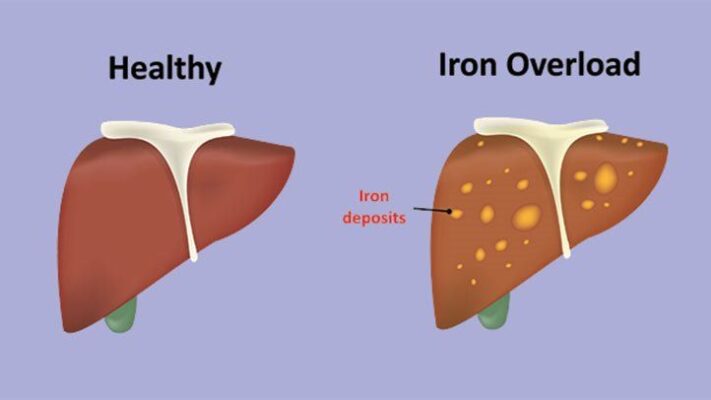Hemochromatosis (iron overload)
A 2005 study shows that 1 in 250 people have a mutation in the HFE gene, which is responsible for hemochromatosis (iron overload). However, not everyone with this mutation will develop the disease. another research suggests that the incidence of hemochromatosis is higher in some populations, such as those of Northern European descent.
What is hemochromatosis?
Hemochromatosis, or iron overload, is a condition where the body absorbs excessive dietary iron, leading to organ damage over time. In a research by Pietrangelo, it’s primarily an inherited disorder but can also result from factors like frequent blood transfusions. The signs and symptoms of hemochromatosis can vary depending on the severity of the condition and how long it has been present.
The HFE gene mutation causes a problem with the body’s regulation of iron absorption. The HFE gene helps regulate the amount of iron that is absorbed from the diet. When this gene is mutated, it can cause the body to absorb too much iron. This excess iron is then stored in the organs, which can lead to hemochromatosis.
How hemochromatosis is diagnosed
Blood tests are the most common way to diagnose hemochromatosis.
These tests measure the levels of iron and ferritin in the blood. Ferritin is a protein that stores iron in the body. High levels of ferritin can be a sign of hemochromatosis.

Symptoms of hemochromatosis
In men, erectile dysfunction and reduced libido are common. As noted by Allen et al, hemochromatosis symptoms also include fatigue, joint pain, abdominal pain, and heart issues. In women, it can cause irregular periods, weight loss, and infertility.
Causes of hemochromatosis
The HFE gene mutation is the leading cause. Other genetic mutations, blood transfusions, and unknown factors also contribute. In an article by Cleveland Clinic, about 20% of hemochromatosis cases lack a known cause
HFE gene mutation
This is the most common cause of hemochromatosis. The HFE gene is responsible for regulating the amount of iron absorbed from the diet. When this gene is mutated, it doesn’t work properly, and too much iron is absorbed from the diet. This leads to an excess of iron in the body, which can cause hemochromatosis.
Other genetic mutations that can cause hemochromatosis
There are several different genes that have been linked to hemochromatosis, including the HJV, HAMP, and TFR2 genes.
Mutations in these genes can also lead to an excess of iron in the body. These genetic mutations are much less common than the HFE gene mutation, but they can still cause hemochromatosis.
Blood transfusions
Sometimes, people who receive frequent blood transfusions can develop hemochromatosis. This is because blood transfusions contain iron, and this iron can build up in the body over time. People who have hemoglobin disorders, such as sickle cell anemia, are especially at risk for developing hemochromatosis from blood transfusions.
Risk factors for hemochromatosis
There are several risk factors for hemochromatosis. The most common risk factor is having a family history of the disease. If a person has a first-degree relative, such as a parent or sibling, with hemochromatosis, they are at increased risk for the disease. Other risk factors include having European ancestry, being a man, and having liver disease.
Treatment for hemochromatosis
The main goal of treatment is to remove excess iron from the body.
This can be done through blood donations, medication, and a low-iron diet. Sometimes, treatment may also involve chelation therapy, which is a process that helps remove excess iron from the body.
Possible complications of hemochromatosis
If hemochromatosis is left untreated, it can lead to a number of health problems. These include liver disease, heart disease, diabetes, arthritis, reproductive problems, and skin color changes. It’s important to treat hemochromatosis early to avoid these complications.
Your Wellness Is Our Concern At Fekomi Wellness
Are you suffering from sexual dysfunctions such as erectile dysfunction, premature (delayed) ejaculation, and low libido? Fekomiherbals has the ultimate solution.
Also, our team of highly qualified and certified healthcare consultants at Fekomi wellness are always ready and happy to help you with your health concerns. Visit Fekomi wellness today to book an appointment and get started on your health journey. Kindly call our desk line on +2349074197154 for more enquiries.
References
1. Adams PC, Reboussin DM, Barton JC, et al. Hemochromatosis and iron-overload screening in a racially diverse population. *N Engl J Med*. 2005;352(17):1769-1778. doi:10.1056/NEJMoa041534. https://www.nejm.org/doi/full/10.1056/NEJMoa041534.
2. Pietrangelo A. Hereditary hemochromatosis—a new look at an old disease. *N Engl J Med*. 2004;350(23):2383-2397. doi:10.1056/NEJMra031573. https://www.nejm.org/doi/full/10.1056/NEJMra031573.
3. Feder JN, Gnirke A, Thomas W, et al. A novel MHC class I-like gene is mutated in patients with hereditary haemochromatosis. *Nat Genet*. 1996;13(4):399-408. doi:10.1038/ng0896-399. https://www.nature.com/articles/ng0896-399.
4. Allen KJ, Gurrin LC, Constantine CC, et al. Iron-overload-related disease in HFE hereditary hemochromatosis. *N Engl J Med*. 2008;358(3):221-230. doi:10.1056/NEJMoa073286. https://www.nejm.org/doi/full/10.1056/NEJMoa073286.
5. Cleveland Clinic. Hemochromatosis: causes and risks. Cleveland Clinic website. https://my.clevelandclinic.org/health/diseases/14971-hemochromatosis. Published April 12, 2023. Accessed April 10, 2025.
6. Camaschella C. Juvenile hemochromatosis and other non-HFE iron overload disorders. *Blood*. 2005;106(4):1189-1197. doi:10.1182/blood-2005-01-0072. https://ashpublications.org/blood/article/106/4/1189/21113/Juvenile-hemochromatosis-and-other-non-HFE-iron.
7. Olynyk JK, Cullen DJ, Aquilia S, et al. A population-based study of the clinical expression of the hemochromatosis gene. *Gastroenterology*. 1999;117(4):890-897. doi:10.1016/S0016-5085(99)70345-0. https://www.gastrojournal.org/article/S0016-5085(99)70345-0/fulltext.

Thank you